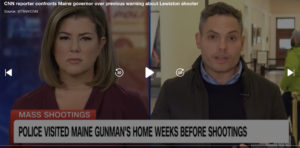Mental Health Partnership puts Police Investigations at Risk

What did the treating psychiatrist know about Robert Card, the Maine shooter before the police were involved?
CNN’s “deep” reporting of Lewiston Maine shooter, Robert Card, fails to explore crucial questions about communication, collaboration, and the shared responsibility for the well-being of individuals in crisis.
When police are aware of an individual’s mental health status, it prompts a critical examination of what information psychiatrists, as mental health professionals, may possess and how this knowledge is communicated.
Law enforcement officers frequently find themselves on the front lines of interactions with individuals in various states of mental distress and too often on multiple psychiatric mind-altering drugs. Being aware of an individual’s mental health history can significantly impact the approach they take during encounters. So, it begs the questions about what the psychiatric industry knew about Robert Card prior to the shooting event and police intervention?
Both Federal and State governments have forged very special relationships with the psychiatric industry. It’s a dangerous one. It’s called ‘the behavioral health oversight partnership’ and it operates in every state (sample link of CT) and is comprised of behavioral health contractors and “stakeholders.” It operates outside the legislative process and is basically a committee that oversees itself, writes legislation, and reports to the executive branch of government. This collaboration has focused on “access to mental health treatment” to such a degree that billions of taxpayer dollars have been invested to push the concept of reducing stigma, and barriers to treatment and has expanded the role of psychiatry into every aspect of society without any accountability.
Psychiatry’s role involves diagnosing conditions, prescribing treatments, and providing long-term care. A billion-dollar industry and growing. In the investigative process, after each mass killing, the public is told that there are privacy laws protecting patient confidentiality,. But there exists a delicate balance between safeguarding individuals’ rights and ensuring that pertinent information is shared with those who may need it for investigative purposes.
The challenge lies in establishing effective communication channels between mental health professionals and law enforcement. Yet, this delicate balance nuanced approach that respects patient privacy while recognizing the potential implications for public safety is a complete failure.
In fact, the psychiatric industry has convinced lawmakers for the need to have collaborative efforts, such as crisis intervention training for police officers, aim to bridge this gap by fostering understanding and improving responses to mental health crises. This often means embedding mental health or behavioral health vendors in the police stations. However, we saw this program in action in the Tennessee mass shooting; where law enforcement failed to investigate the mental health component as it may have been a contributing factor and sided with psychiatry to withhold the treating psychiatrist name, treatment records, and a damning “manifesto” from the public. This is a fundamental pattern in mass killings and can no longer be ignored.
Still, questions persist about the extent of information shared between psychiatrists and law enforcement and the mechanisms in place to facilitate this exchange. That process needs to be in full view of the public. As the government “behavioral health partnership” looks to push for more access into the law enforcement agencies, law enforcement agencies should be put on notice they will be blamed for their failures, but the “Partnership” will absolve psychiatry. Either way, the public loses out on much needed information. The motives of the killers are still unknown; could the psychiatric drug treatment be the root cause?

